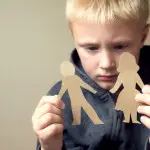
Here’s the reality: You may not like your ex all that much anymore but, presumably, your child still loves him or her. While your 50/50 custody arrangement – or otherwise – may be amenable to your work schedule, social calendar, and preferences, have you stopped to consider how your days on and off the clock as a parent impact the lives of your children? Joint custody arrangements do work out well for many families but, for some kids, limited time with the non-custodial parent just isn’t enough.
Navigating your child’s education as a divorced parent >>
When 50/50 Feels like 80/20
The best interests of the child are at the forefront of every decision the court makes in a divorce case, particularly when it comes to determining custody, parenting time, and child support. One of the most common arrangements of divorced parents is for one parent to have primary custody and the other parent to have one weeknight, every other weekend, half the summer, and alternating holidays. This may sound fair enough, but it’s actually not. In fact, it could be considered quite inadequate – in your child’s opinion.
Kids need access to both of their parents, at any time. A child may live full-time with one parent, but seeing the other parent just one day a week and every other weekend can be an arrangement that is lacking. To children, stability is seeing the same people every day who have been in their lives since birth.
Smartphones do make it far easier to stay in touch with the non-custodial parent on off-days, and thank goodness for this convenience, but no piece of technology can make up for face-to-face, in-person interactions. The hugs and kisses and eye contact are immeasurable and irreplaceable. And sometimes, a boy just needs his mom, or a girl just needs her dad, or vice versa. Being “stuck” with the non-preferred parent in that moment can be incredibly troubling for a young child, tween, or teen.
Free and frequent access to the non-custodial parent, children insist, has made their parents’ divorce far more tolerable. In a recent study, it was found that children who live with both of their divorce parents have fewer problems than the kids who live with only one parent. Of course, this means kids are being shuffled back and forth between two homes and keeping necessities in two places (or being forced to develop an amazing memory so they don’t forget equipment, instruments, books, or lovies at one place or another). In lieu of this shared custody arrangement, there is always bird nesting.
7 things to remember when you tell your kids about your divorce >>
Don’t Assume Your Kids Are Resilient
During and after your divorce, when you lament the situation that you have created for your kids, you will read and be told repeatedly that children are resilient. Kids can go to a new school, deal with wearing glasses, weather the death of a grandparent, and handle their parents’ divorce without being any worse for the wear. You’ll hear it, but in your gut you probably won’t believe it completely. And, rest assured, your kids are being changed forever by the shift in your married status.
While these statements are not meant to pack on the guilt, they are simply to draw attention to the fact that your kids have feelings too. They are impacted by the decisions you make in your divorce. As you go about your choices, consider how your requests and demands and refusals will affect your children. The last thing you may want to do is see your ex’s mug on your doorstep three days a week to play ball with your son in the backyard or take your girl to practice. But your child needs these interactions. Your child needs your flexibility and your willingness to let them still enjoy their time with the other parent.
Divorce is a break between a husband and wife, not between a parent and children. Disrupted visitations and limited time with the non-custodial parent may feed your need for spite, but it will also feed your child’s feelings of anger and resentment. These are not emotions that are easy to outgrow. Their relationship with you and their other parent will shift forever, and not in positive ways.
There is a reason divorce courts keep the child’s best interests at the forefront of their decisions: Kids’ feelings, opinions, and positions matter.
After your Michigan divorce: 3 tips for healthy co-parenting >>
If you are ready to talk about divorce, contact an experienced Michigan divorce attorney at Michigan Divorce Help in Mt. Clemens, MI, to schedule your consultation.